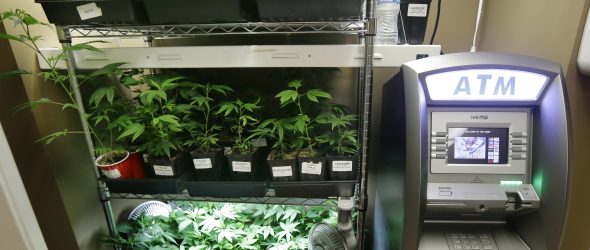The Sarasota County Commission on Monday decided to cap the number of licensed dispensaries at five. In citing “health, safety and morals,” the unanimous verdict may ultimately hit the county in the pocketbook
SARASOTA — No matter which route takes you past 2864 Clark Road, you’ll pass any number of places where you can load up on beer or wine as you top off the tank, head home, and spend the evening mitigating various insults and ailments with “daddy’s medicine.”
A century ago in another America, those retail outlets would’ve been banned and regarded as “detrimental to the health, safety, morals, order, comfort, convenience or appearance of the neighborhood.” But on Monday, Sarasota County Commissioners employed that language to reject the opening of a sixth medical marijuana dispensary at 2864.
Nursing fresh memories of the pill-mill epidemic that clogged Florida’s street corners a decade ago, Commissioners voted unanimously to prevent it from happening here again, even as the number of alcohol retailers jeopardizing health, safety, morals, etc., far outnumbered the constipation-inducing pill mills at the peak of the scandal and continue to endanger the appearance of Sarasota’s neighborhoods.
But watch how long the County’s ideas about health, safety, morals, etc., hold up when the potential tax windfalls start migrating elsewhere.
“This is all wrong — there aren’t enough shops as it is, and when you drop in, the lines are usually too long,” argues Sam Schneider, who retails CBD products from his Rocketman store in nearby Gulf Gate but has to make a 20-minute drive to Fruitville Road to get his medical THC from the MUV dispensary.
“They’re interfering with the free market. They’re causing a lot of people to waste time, pay higher prices, and they’re going to lose a ton of revenue to neighboring counties. I’d tell them to do their research, and they’ll discover that when these places open, property values go up, the crime rates go down, and the county makes a lot of money.”
Studies by the Clever Real Estate website appear to back Schneider up, sort of. Although its survey failed to find significant home-price hikes in states which have medical marijuana-only laws, the numbers jumped in legal adult-use communities.
“States that legalize recreational cannabis see an immediate bump in home values following legalization, even without retail dispensaries opening up,” states the report, issued in April. “From 2017 to 2019, cities where recreational marijuana is legal saw home values increase $6,337 more than cities where marijuana is illegal.”
Clever Real Estate did not document a decline in crime using case studies in Colorado and Washington State; nor, however, did it detect an uptick in criminal activity following legalization. Likewise, a just-released study by the journal Justice Quarterly “observed no statistically significant long-term effects of recreational cannabis laws or the initiation of retail sales on violent or property crimes rates in these states.”
Schneider’s point about a shortage of medical marijuana treatment centers (MMTCs) is more difficult to dispute.
The Commission’s decision to stop Knox Medical from opening an MMTC at a shuttered pool supply store on Clark reflects the arbitrary nature of local prohibition enabled by Legislative formulas enacted in 2017.
After 71 percent of voters approved a medical marijuana referendum in 2016, state lawmakers agreed that dispensaries could open in any community that had a pharmacy. They divided Florida into five population-based regions, with the number of facilities determined by patient-registry numbers. The cap would be 17 to 21 treatment centers, depending on demand.
An appeals court in July declared the Legislature’s restrictive interpretation of the referendum as unconstitutional. But, says Taylor Biehl, policy director of the Marijuana Business Association of Florida, “We remain log-jammed with litigation — now having approached a two-year standstill. Seven licenses should’ve been issued by now. It’s a sad state of affairs.
“It has become increasingly difficult to site retail dispensaries throughout the state based on the option of moratoriums and inconsistent zoning and permitting requirements in local governments. Without more flexibility in zoning and permitting, patient access is being gravely handicapped and, in some instances, denied.”
Florida’s Office of Medical Marijuana Use now counts 375,553 patients, 271,501 of whom have active cards. A dozen MMTCs have brick-and-mortar dispensaries, a 13th is delivery-only. Nine other licensees are waiting to launch.
Robert Roundtree, editor-in-chief at Florida Medical Marijuana News, says the sort of ordinance adopted by Sarasota County before legislators mapped out a statewide formula is fairly typical of communities fearing the loss of local autonomy in the face of what appears to be an irreversible cannabis movement. But with the MMTC limits set to expire in 2020, he says cities need to be clear-eyed about what they’re risking with continued restrictions.
“They’re losing money, they losing jobs — good-paying jobs at these dispensaries, and they very safe jobs,” Roundtree says. “They bring more business to the businesses surrounding them, and it’s going to their neighbors. And when adult use comes around, imagine how much more money they’re going to lose.”


